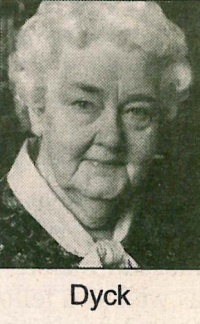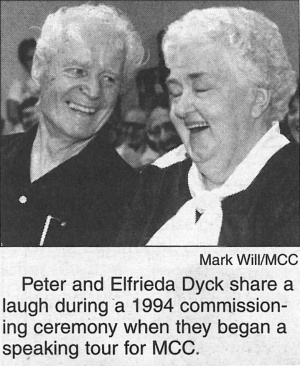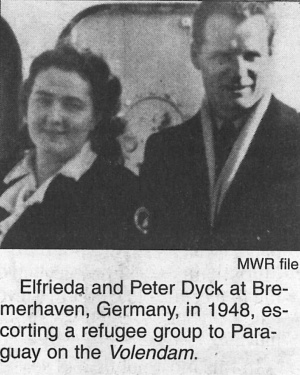If this site was useful to you, we'd be happy for a small donation. Be sure to enter "MLA donation" in the Comments box.
Dyck, Elfrieda Klassen (1917-2004): Difference between revisions
New page: '''Mennonite Weekly Review'' obituary: 2004 Aug 30 p. 1 '''Mennonite Weekly Review'' obituary: 2004 Dec 27 p. 7 Category:Mennonite Weekly Review obituaries |
No edit summary |
||
| (11 intermediate revisions by the same user not shown) | |||
| Line 1: | Line 1: | ||
''Mennonite Weekly Review'' obituary: 2004 Aug 30 p. 1, 2 | |||
Birth date: 1917 | |||
text of obituary: | |||
<center><font size="+2">'''Leader of refugees dies at 87'''</font></center><br> | |||
<center><font size="+1">Elfrieda Dyck MCC worker, modeled service with humanity</font></center> | |||
<span style="font-variant:small-caps">'''By Mark Beach'''</span> | |||
<font size="1">MCC News Service</font> | |||
AKRON, Pa. — In May 1948, when the good ship ''Charlton Monarch'' turned out to be not so good, Elfrieda Dyck stepped up to the deck. | |||
[[Image:Dyck_elfrieda_klassen_2004.jpg|200px|right]] She did what everyone including her husband, Peter, expected she would do. She successfully led 860 war-weary European Mennonite refugees to safety and a new life in Paraguay. | |||
The story of the ''Charlton Monarch,'' a ship that fell victim to engine and crew problems and became stranded off the coast of Brazil, may have been a defining moment in Dyck's life. | |||
But it is only one moment in a life filled with service to others through Mennonite Central Committee, her church, community and family. | |||
Elfrieda Klassen Dyck, a longtime MCC worker who helped resettle European refugees after World War II and who exemplified the spirit of Christian service throughout her life, died Aug. 20 in Scottdale. She was 87. | |||
"Refugee work is just a part of her life," said son-in-law Jack Scott of Scottdale. "Her life was spent so much caring for others, whether it was on the ships going across the Atlantic or her own family. Very much in her heart was a concern for refugees." | |||
Along with her husband of 60 years, Dyck served with MCC during and after World War II when refugees began flooding out of war-torn Europe. As recently as 10 years ago, at the time of MCC's 75th anniversary, she and Peter set out on a speaking tour across the United States and Canada, recounting their experiences. | |||
Dyck was born in Donskaja, now Samara, Russia, in 1917, the youngest of 14 children. In 1925, when she was 7, her family fled Russia and settled in Winnipeg, Man. There she graduated from St. Boniface Hospital in 1939 as a registered nurse. | |||
Dyck's nursing skills led to her involvement with MCC. In 1942, during World War II, she began a one-year term of service at a home for babies in North Wales and later at a boys' convalescent home in northern England. | |||
During World War II, she was among the first volunteers for MCC overseas service. | |||
While serving in England she met her husband, an MCC worker as well as a fellow immigrant to Canada, coming from Lysanderhoh, Am Trakt, Russia. They married in 1944 and continued working for MCC after the war. | |||
Dyck was in charge of a Mennonite refugee camp in Berlin from 1946-47. With Peter and other MCC workers, she gathered scattered Mennonite refugees and helped many resettle in Paraguay. | |||
[[Image:Dyck_peter&elfrieda_1994.jpg|300px|right]] The Dycks told their story of aiding the European refugees in ''Up from the Rubble'' (Herald Press, 1991). | |||
"Elfrieda and Peter Dyck have spent a lifetime of service ministering to homeless and hungry refugees and to the faith community around the world," said MCC executive director Ronald J. R. Mathies. "Elfrieda's care for the hurting, her gracious hospitality and her empathetic ear for all those who met her have made her an example of Christian compassion to generations." | |||
While her husband is best known for sharing the story of their postwar experiences, friends remember Elfrieda having an equally compelling story to share. | |||
According to historian Robert S. Kreider of North Newton, Kan., she would listen to her husband's version of their experiences and then calmly say: "But Peter, I remember it this way." | |||
In 2000, the Dycks were listed in ''The Mennonite'' among the 20 people who had the most influence on the General Conference Mennonite Church and the Mennonite Church during the 20th century. Their storytelling and service distinguished them as shapers of Mennonite identity, according to the magazine. | |||
[[Image:Dyck_peter&elfrieda_volendam.jpg|300px|right]] "She embodies the motto of MCC — 'In the name of Christ' — always sensitive and thoughtful of others, so humble," Kreider said. | |||
Kreider interviewed the Dycks at length in 1987, capturing details of their lives that often did not show up in their many public speaking engagements. Kreider also served in Europe with them. | |||
During that interview, Elfrieda summed up her experiences with the ''Charlton Monarch.'' | |||
"I think the Lord was really good to me in all this," she said. "I couldn't have done any of this without his help and guidance." | |||
Kreider believes Dyck's background helped her understand the plight of the refugees she helped. | |||
As an emigrant due to war, famine and persecution in Russia, "she knew suffering and tragedy in the early 20th century," Kreider said. "She in turn was one who cared for others, competent in every crisis and always with a humble Christ-like spirit." | |||
She avoided the spotlight her experiences might otherwise have earned her. | |||
"I can hear her saying: 'Just don't make all this fuss,'" said friend Kathy Hostetler of Akron. | |||
To her friends, Dyck was down-to-earth but also extraordinary. | |||
Hostetler recalled how Dyck drove to work on the night shift at Fairmont Rest Home in Farmersville. She would toot her car horn three times as she drove past, just to let Hostetler know she was on her way to work. | |||
"Sitting down together over coffee, we would reminisce," said Hostetler, recalling when the Dycks lived in Akron from the 1960s to 1980s. | |||
Hostetler also fled Russia as a child, and the two would swap stories about their lives. | |||
When they discussed the events of World War II, and in particular the ''Charlton Monarch,'' "she would say: 'I can't believe i did this,'" Hostetler said. "She had the capacity of rising to the occasion." | |||
Surviving, in addition to her husband, are two daughters, Rebecca Dyck of Montreal and Ruth Scott and her husband, Jack, of Scottdale; five grandchildren and one great-grandchildren and one great-grandchild. She was receded in death by 10 brothers, Cornelius, Frank, George, Henry, Peter, Jake, John, Alexander, Nick and Abe; and three sisters, Lydia Klassen, Justina Peters and Agatha Horch. | |||
A memorial service is being held Aug. 28 at Scottdale Mennonite Church. | |||
The family has asked that donations in memory of Dyck be made to an MCC fund for refugee assistance. | |||
[[Category:Mennonite Weekly Review obituaries]] | [[Category:Mennonite Weekly Review obituaries]] | ||
Latest revision as of 15:16, 5 March 2015
Mennonite Weekly Review obituary: 2004 Aug 30 p. 1, 2
Birth date: 1917
text of obituary:
By Mark Beach MCC News Service
AKRON, Pa. — In May 1948, when the good ship Charlton Monarch turned out to be not so good, Elfrieda Dyck stepped up to the deck.

She did what everyone including her husband, Peter, expected she would do. She successfully led 860 war-weary European Mennonite refugees to safety and a new life in Paraguay.
The story of the Charlton Monarch, a ship that fell victim to engine and crew problems and became stranded off the coast of Brazil, may have been a defining moment in Dyck's life.
But it is only one moment in a life filled with service to others through Mennonite Central Committee, her church, community and family.
Elfrieda Klassen Dyck, a longtime MCC worker who helped resettle European refugees after World War II and who exemplified the spirit of Christian service throughout her life, died Aug. 20 in Scottdale. She was 87.
"Refugee work is just a part of her life," said son-in-law Jack Scott of Scottdale. "Her life was spent so much caring for others, whether it was on the ships going across the Atlantic or her own family. Very much in her heart was a concern for refugees."
Along with her husband of 60 years, Dyck served with MCC during and after World War II when refugees began flooding out of war-torn Europe. As recently as 10 years ago, at the time of MCC's 75th anniversary, she and Peter set out on a speaking tour across the United States and Canada, recounting their experiences.
Dyck was born in Donskaja, now Samara, Russia, in 1917, the youngest of 14 children. In 1925, when she was 7, her family fled Russia and settled in Winnipeg, Man. There she graduated from St. Boniface Hospital in 1939 as a registered nurse.
Dyck's nursing skills led to her involvement with MCC. In 1942, during World War II, she began a one-year term of service at a home for babies in North Wales and later at a boys' convalescent home in northern England.
During World War II, she was among the first volunteers for MCC overseas service.
While serving in England she met her husband, an MCC worker as well as a fellow immigrant to Canada, coming from Lysanderhoh, Am Trakt, Russia. They married in 1944 and continued working for MCC after the war.
Dyck was in charge of a Mennonite refugee camp in Berlin from 1946-47. With Peter and other MCC workers, she gathered scattered Mennonite refugees and helped many resettle in Paraguay.

The Dycks told their story of aiding the European refugees in Up from the Rubble (Herald Press, 1991).
"Elfrieda and Peter Dyck have spent a lifetime of service ministering to homeless and hungry refugees and to the faith community around the world," said MCC executive director Ronald J. R. Mathies. "Elfrieda's care for the hurting, her gracious hospitality and her empathetic ear for all those who met her have made her an example of Christian compassion to generations."
While her husband is best known for sharing the story of their postwar experiences, friends remember Elfrieda having an equally compelling story to share.
According to historian Robert S. Kreider of North Newton, Kan., she would listen to her husband's version of their experiences and then calmly say: "But Peter, I remember it this way."
In 2000, the Dycks were listed in The Mennonite among the 20 people who had the most influence on the General Conference Mennonite Church and the Mennonite Church during the 20th century. Their storytelling and service distinguished them as shapers of Mennonite identity, according to the magazine.

"She embodies the motto of MCC — 'In the name of Christ' — always sensitive and thoughtful of others, so humble," Kreider said.
Kreider interviewed the Dycks at length in 1987, capturing details of their lives that often did not show up in their many public speaking engagements. Kreider also served in Europe with them.
During that interview, Elfrieda summed up her experiences with the Charlton Monarch.
"I think the Lord was really good to me in all this," she said. "I couldn't have done any of this without his help and guidance."
Kreider believes Dyck's background helped her understand the plight of the refugees she helped.
As an emigrant due to war, famine and persecution in Russia, "she knew suffering and tragedy in the early 20th century," Kreider said. "She in turn was one who cared for others, competent in every crisis and always with a humble Christ-like spirit."
She avoided the spotlight her experiences might otherwise have earned her.
"I can hear her saying: 'Just don't make all this fuss,'" said friend Kathy Hostetler of Akron.
To her friends, Dyck was down-to-earth but also extraordinary.
Hostetler recalled how Dyck drove to work on the night shift at Fairmont Rest Home in Farmersville. She would toot her car horn three times as she drove past, just to let Hostetler know she was on her way to work.
"Sitting down together over coffee, we would reminisce," said Hostetler, recalling when the Dycks lived in Akron from the 1960s to 1980s.
Hostetler also fled Russia as a child, and the two would swap stories about their lives.
When they discussed the events of World War II, and in particular the Charlton Monarch, "she would say: 'I can't believe i did this,'" Hostetler said. "She had the capacity of rising to the occasion."
Surviving, in addition to her husband, are two daughters, Rebecca Dyck of Montreal and Ruth Scott and her husband, Jack, of Scottdale; five grandchildren and one great-grandchildren and one great-grandchild. She was receded in death by 10 brothers, Cornelius, Frank, George, Henry, Peter, Jake, John, Alexander, Nick and Abe; and three sisters, Lydia Klassen, Justina Peters and Agatha Horch.
A memorial service is being held Aug. 28 at Scottdale Mennonite Church.
The family has asked that donations in memory of Dyck be made to an MCC fund for refugee assistance.